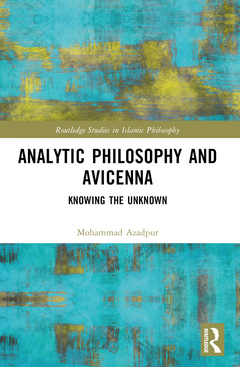Description
Analytic Philosophy and Avicenna
Knowing the Unknown
Routledge Studies in Islamic Philosophy Series
Author: Azadpur Mohammad
Language: English
Subject for Analytic Philosophy and Avicenna:
Keywords
Scheme Content Dualism; Non-inferential Knowledge; Noninferential Knowledge; Non-conceptual Content; Dator Formarum; Representational Adequacy; Hierarchical Account; Contingent Deliverances; Avicenna’s Account; Token Mental Events; Avicenna’s Position; Holy Intellect; Avicenna’s Philosophy; Sellars’s Account; Manifest Image; Separate Intellect; Sensory Content; Sellars’s View; Meno’s Paradox; Sense Datum Empiricists; Overt Verbal Behavior; Epistemic Facts; Avicenna’s View; Reliable Differential Responsive Disposition; Sheer Receptivity
Publication date: 06-2023
· 15.6x23.4 cm · Paperback
Approximative price 148.11 €
In Print (Delivery period: 14 days).
Add to cartPublication date: 09-2021
· 15.6x23.4 cm · Hardback
Publication date: 03-2020
· 15.6x23.4 cm · Hardback
Description
/li>Contents
/li>Readership
/li>Biography
/li>
This work engages in a constructive, yet subtle, dialogue with the nuanced accounts of sensory intentionality and empirical knowledge offered by the Islamic philosopher Avicenna.
This discourse has two main objectives: (1) providing an interpretation of Avicenna?s epistemology that avoids reading him as a precursor to British empiricists or as a full-fledged emanatist and (2) bringing light to the importance of Avicenna?s account of experience to relevant contemporary Anglo-American discussions in epistemology and metaphysics. These two objectives are interconnected. Anglo-American philosophy provides the framework for a novel reading of Avicenna on knowledge and reality, and the latter, in turn, contributes to adjusting some aspects of the former.
Advancing the Avicennian perspective on contemporary analytic discourse, this volume is a key resource for researchers and students interested in comparative and analytic epistemology and metaphysics as well as Islamic philosophy.
Introduction: Avicenna and the Sellarsian Account of Experience 1. Sellars on the Empirical Grounds of Knowledge 2. Sellars on the Pseudo-intentionality of the Senses 3. Perennial Philosophy: Against Scientism and Reason-nature Dualism 4. Avicenna’s Empiricism: Meno’s Dilemma and the Sensory Grounds of Knowledge 5. The Mind’s Involvement in Sense Perception: Avicenna on Sensory Intentionality and the Unity of Being Conclusion: On Avicenna and the so-called Common Medieval View
Mohammad Azadpur is Professor of Philosophy at San Francisco State University. His work brings Islamic philosophers into dialogue with modern European and Anglo-American philosophers. His first book, Reason Unbound (2011), explored the primacy of ethics in the activity of philosophy.




